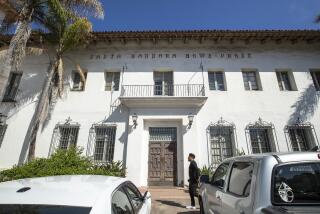High Court Lets Detroit Papers Join
- Share via
WASHINGTON — An evenly divided Supreme Court today upheld the planned partial merger of Detroit’s two daily newspapers.
The justices, by a 4-4 vote, affirmed a ruling that former Atty. Gen. Edwin Meese III acted reasonably last year when he approved a joint operating agreement for the two papers, the Detroit Free Press and The Detroit News.
The federal Newspaper Preservation Act of 1970 authorizes the attorney general to give financially failing newspapers an exemption from federal antitrust laws. Today’s ruling was the court’s first on a joint operating agreement between newspapers.
The partial merger had been challenged by a group of Michigan advertisers and readers.
Under the 100-year agreement, the two newspapers would combine their business, advertising and production departments but maintain separate news and editorial staffs.
The News would receive 55% of the merged company’s profits during the first year but that percentage would drop to 50% by the seventh year. Thereafter, the profits would be evenly divided.
Today’s 4-4 vote, which under the high court’s rules automatically upheld a federal appeals court decision, was set up when Justice Byron R. White disqualified himself from the case for unexplained “personal reasons.”
A split vote by the justices sets no binding precedent for similar controversies in the future, mainly because there is no clue as to the reasoning of any justice.
Today’s ruling was announced in a one-sentence decision that did not divulge which justices voted to allow the partial merger and which voted against it.
The Detroit News is owned by Gannett Co. Inc., the nation’s largest newspaper publishing group. The Free Press is owned by Knight-Ridder Inc., the second largest. The organizations proposed the partial merger in 1986.
Opponents of the deal, calling themselves Michigan Citizens for an Independent Press, contend that the Free Press is not a failing newspaper even though it lost $10 million between 1981 and 1986.
The opponents say the Free Press and the News, which lost $50 million in the same period, were unprofitable solely because both papers cut prices in an unsuccessful effort to force each other out of business.
More to Read
Sign up for Essential California
The most important California stories and recommendations in your inbox every morning.
You may occasionally receive promotional content from the Los Angeles Times.










